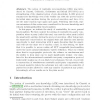31 search results - page 4 / 7 » Secure Arithmetic Computation with No Honest Majority |
EDCC
2005
Springer
14 years 1 months ago
2005
Springer
The fair exchange problem is key to trading electronic items in systems of mutually untrusted parties. In modern variants of such systems, each party is equipped with a security mo...
STOC
2006
ACM
14 years 7 months ago
2006
ACM
d abstract) Yuval Ishai Eyal Kushilevitz Yehuda Lindell Erez Petrank It is well known that the secure computation of non-trivial functionalities in the setting of no honest majori...
CRYPTO
2006
Springer
13 years 11 months ago
2006
Springer
In a seminal paper, Feldman and Micali (STOC '88) show an n-party Byzantine agreement protocol tolerating t < n/3 malicious parties that runs in expected constant rounds. H...
CORR
2010
Springer
13 years 6 months ago
2010
Springer
A protocol for computing a functionality is secure if an adversary in this protocol cannot cause more harm than in an ideal computation where parties give their inputs to a truste...
EUROCRYPT
2009
Springer
14 years 8 months ago
2009
Springer
Abstract. The notion of resettable zero-knowledge (rZK) was introduced by Canetti, Goldreich, Goldwasser and Micali (FOCS'01) as a strengthening of the classical notion of zer...

